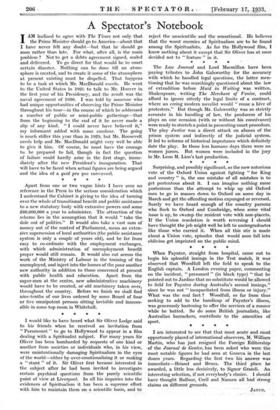A Spectator's Notebook T AM inclined to agree with The
Times not only that the Prime Minister should go to America—about that I have never felt any doubt—but that he should go soon rather than late. For what, after all, is the main problem ? Not to get a debts agreement signed, sealed and delivered. To go direct for that would be to court certain disaster. Nothing can be done till an atmo- sphere is created, and to create it some of the atmosphere at present existing must be dispelled. That happens to be a task at which Mr. MacDonald excels. He went to the United States in 1929 to talk to Mr. Hoover in the first year of his Presidency, and the result was the naval agreement of 1930. I was told by someone who had unique opportunities of observing the Prime Minister throughout his tour—in the course of which he addressed a number of public or semi-public gatherings—that from the beginning to the end of it he never made a slip of any kind. "I could never have believed it," my informant added with some candour. The going is much stiffer this year than in 1929, but Mr. Roosevelt needs help and Mr. MacDonald might very well be able to give it him. Of course, he must have the courage to be prepared to fail, though in fact the question of failure could hardly arise in the first stage, imme- diately after the new President's inauguration. That will have to be faced when actual figures are being argued and the idea of a quid pro quo canvassed.






































 Previous page
Previous page